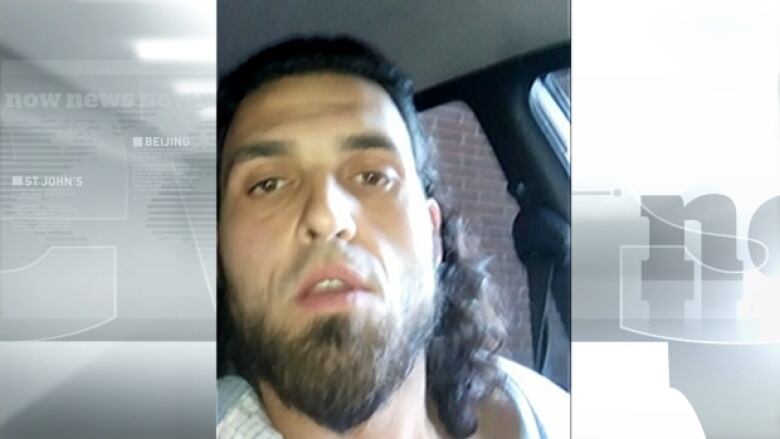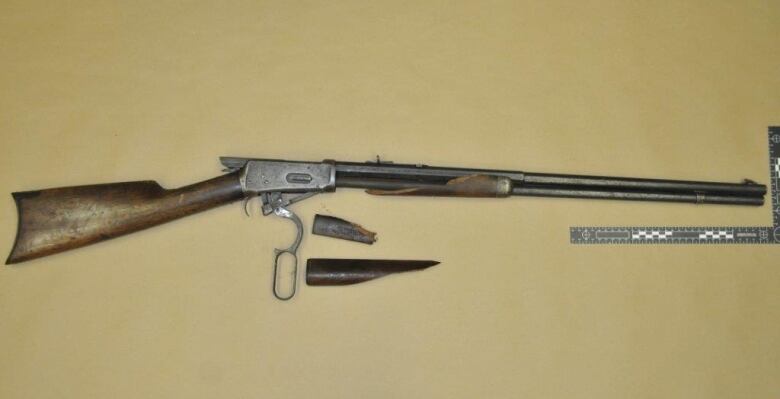Michael Zehaf-Bibeau warns in video: 'You gotta be careful'
Parliament Hill shooter tied attack on Cpl. Nathan Cirillo to Canadian missions in Afghanistan, Iraq

Parliament Hill shooter Michael Zehaf-Bibeau tied his attack on Cpl. Nathan Cirillo to Canadian Forces missions in Afghanistan and Iraq in a cellphone video he recorded ahead of the fatal shooting on Oct. 22, 2014.
Canadians got their first look at the video Friday morning during a special meeting of the House public safety committee where RCMP Commissioner Bob Paulson briefed MPs on the investigation into the shooting of Cirillo, who was on sentry duty at the National War Memorial, and Zehaf-Bibeau's storming of Parliament Hill.
"This is in retaliation for Afghanistan and because [Prime Minister Stephen Harper] wants to send his troops to Iraq," Zehaf-Bibeau, 32, says in the video.
- Mobile users: Follow the CBC live blog here
- Zehaf-Bibeau case invites contrasts to Australian experience
- Hill shooter's cellphone manifesto barely a minute long
"Canada's officially become one of our enemies by fighting and bombing us and creating a lot of terror in our countries and killing us and killing our innocents. So, just aiming to hit some soldiers just to show that you're not even safe in your own land, and you gotta be careful."
Zehaf-Bibeau refers to himself as part of the Mujahideen, the army of holy warriors engaged in jihad.

Paulson said the RCMP edited 18 seconds out of the video for "sound operational" reasons. Thirteen seconds were cut from the beginning and five seconds from the end.
Paulson said the national police force continues to investigate whether anyone aided Zehaf-Bibeau in the attack.
Speaking to reporters following the meeting, Paulson said he believes someone else was involved.
"I put the caveat that it is an ongoing investigation. And I wouldn't characterize it as a network, as it's commonly understood, but I am persuaded that he was influenced by other individuals towards these crimes. And so in that sense I'm of the view that there are other individuals involved."
400 interviewed
Paulson warned during the meeting that if anybody aided, abetted, facilitated or counselled Zehaf-Bibeau in the attack, those individuals will be charged with terrorism offences.
- Was Michael Zehaf-Bibeau's attack on Parliament Hill his Plan B?
- Ottawa shooting: Michael Zehaf-Bibeau wanted Libyan passport
- Michael Zehaf-Bibeau showed B.C. co-workers jihadi videos
"It's not relevant to us, or our investigation, what kind of terrorist Zehaf-Bibeau was, or if he was a particularly intelligent, sophisticated, influential or personally disciplined terrorist," Paulson said.
"To us, it all turns on the evidence we collect which we compare against the statute. What was he doing and why was he doing it?"
The RCMP has more than 130 full-time investigators and staff working on this case and have interviewed more than 400 people, including those Zehaf-Bibeau knew in British Columbia, the people on the Greyhound Bus he took to Ottawa, and the people who saw him at a shelter in Ottawa, Paulson said.
Zehaf-Bibeau was born in 1982 and raised in Laval, Que. As an adult, he lived in Montreal, Vancouver, Squamish, B.C., and Alberta. His mother, a federal government employee, had lunch with him in Ottawa in the days ahead of the shooting, according to an email she sent to Postmedia. His father is a Libyan national.
Paulson said Zehaf-Bibeau was shot multiple times by the RCMP and Parliament Hill security, and had a long knife tied to his wrist when he was killed.
No drugs, alcohol in shooter's system
The meeting was held in the committee room in which the Conservative Party caucus was meeting when Zehaf-Bibeau ran down the hallway before being shot to death at the door to the Library of Parliament.
The NDP caucus was meeting across the hallway during the shooting.

Paulson said a post-mortem test for drugs and alcohol on Zehaf-Bibeau was negative and they've found no evidence he used drugs or alcohol in the days leading up to the attack.
The video was shot around the corner from the Ottawa Police Services headquarters in downtown Ottawa, according to Paulson. Police found the phone in his car following the attack. Zehaf-Bibeau had bought the used car on Oct. 21 and used it for the attack, parking it on Wellington Street at an entrance to the grounds of Parliament Hill.
Zehaf-Bibeau applied for a Canadian passport in Vancouver last August but was told it would be "subject to further review," Paulson recounted. He travelled to Ottawa by hitchhiking and taking the bus and within two hours of arriving went to the Libyan embassy to renew his expired Libyan passport. Libyan officials told Zehaf-Bibeau the application would have to be sent to Libya and that it would take up to a month to resolve because of discrepencies in his identification documents, the top Mountie said.
Two days later, on Oct. 4, Zehaf-Bibeau toured Parliament Hill.
RCMP resources moved
"Throughout his time in Ottawa, Zehaf-Bibeau used publicly available internet and payphones in various locations across the city," Paulson said.
"We now know that he used this as a means to stay in contact with individuals both in the Ottawa region and in British Columbia. We have been able to identify some of these individuals and we continue to pursue this avenue."
New Democrat MP Randall Garrison said he respects Paulson's judgment on cutting out 18 seconds of the video for now.
"I think we have to be careful when we do this, but I think Canadians have a right to know, we live in a free and open society and we have to do our best to protect that kind of society and not let violence change life," he said.
Liberal MP Wayne Easter noted Paulson talked about moving resources — more than 600 people — to counter-terrorism from other areas within the RCMP.
"Commissioner Paulson made it clear that they are drawing resources from other areas and I do see that as a concern," Easter said.